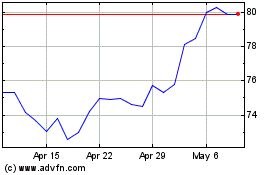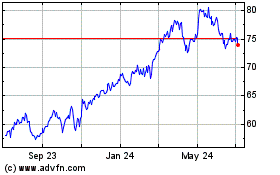By Leslie Scism
The year was 2005. The iPhone didn't exist yet. New York's
attorney general was Eliot Spitzer. And he filed a financial-fraud
lawsuit against Maurice "Hank" Greenberg, chief executive of
American International Group Inc., then one of the most powerful
financial firms in the world.
Next week, the case -- spanning three attorneys general, the
resignation of Mr. Greenberg from AIG and a nearly $185 billion
government bailout of the firm under his successors -- is finally
set to go to trial.
In the civil lawsuit, the government seeks to prove Mr.
Greenberg, now 91 years old, approved two financial maneuvers
between 2000 and 2003 aimed at duping shareholders into believing
AIG's core operating results were better than they were. If found
liable, he may be ordered to hand over millions of dollars from
past bonuses and barred from becoming an officer of a publicly
traded company.
In nearly 40 years of running AIG, Mr. Greenberg rose to
prominence by transforming the company from an obscure insurer into
a global behemoth.
But in the past decade, much of his time has been spent trying
to defend his reputation in the wake of Mr. Spitzer's
challenge.
The trial is to kick off Tuesday with opening statements. The
case is a vestige of the early-2000s when Enron Corp. and other
once-prominent companies were embroiled in accounting
controversies, prompting a wave of crackdowns as authorities looked
at the minutiae of complex financial filings.
The lawsuit details two alleged sham transactions.
In one, authorities allege that Mr. Greenberg initiated a
transaction with Berkshire Hathaway Inc.'s General Re unit to help
AIG improperly boost its claims reserves in 2000 and 2001 by about
$500 million, misleading investors about the amount of losses that
AIG could absorb. Berkshire isn't named as a defendant in the
lawsuit.
The other deal allegedly was designed to mischaracterize
underwriting losses in an auto-warranty business as capital losses.
Insurance investors closely watch underwriting results as core to a
company's operations.
Former AIG Chief Financial Officer Howard Smith, 71 years old,
also is named as a defendant.
Mr. Greenberg and Mr. Smith could be forced to pay back about
$25 million in total bonuses, plus interest, in the case. Mr.
Greenberg's legal bills are expected to top $25 million by the
trial's conclusion, according to his attorney.
In 2013, a federal court approved a settlement of class-action
litigation against Mr. Greenberg brought by AIG shareholders, and,
in 2009, Mr. Greenberg resolved a Securities and Exchange
Commission complaint related to the same matters, neither admitting
nor denying wrongdoing.
Mr. Greenberg was amenable to settling this case, too, but
attempts to reach a resolution, including two mediations, weren't
successful, a person familiar with the matter said, in part because
the initial claim was so high.
In the initial years of the case, the state had sought $6
billion in damages.
"Mr. Greenberg has always been prepared to discuss a reasonable
resolution of this case," said David Boies, the lawyer who heads
Mr. Greenberg's defense.
Mr. Greenberg has maintained the lawsuit was wrongly brought by
Mr. Spitzer as a steppingstone for his successful run for
governor.
Two successors to Mr. Spitzer continued the case, however, which
is being argued under the Martin Act -- a 95-year-old statute that
has been a popular tool in civil and criminal cases.
Its popularity stems from the fact it doesn't require the
showing of a suspect's intent to defraud, which has been criticized
by some for being too low a standard. Other critics have railed
against the statute for its relatively lenient penalties.
Despite the criticism, the law has been used to combat fraud on
Wall Street.
The case involving Mr. Greenberg became controversial
quickly.
Within days of the suit's filing in 2005, former Goldman Sachs
Group Inc. Chairman John Whitehead defended Mr. Greenberg in the
editorial pages of The Wall Street Journal. Mr. Whitehead later
claimed Mr. Spitzer threatened him following the op-ed, which Mr.
Spitzer has denied.
In the years following the case, Mr. Spitzer, a Democrat, was
felled by a sex scandal.
He stepped down in March 2008 as the state's 54th governor, less
than two years after taking office.
Mr. Greenberg is prepared to take the stand in his own defense,
say his attorneys.
"For years, Mr. Greenberg has financed a relentless campaign to
dodge accountability" in the case, said current New York Attorney
General Eric Schneiderman Thursday. "But after a decade of avoiding
trial, Mr. Greenberg will now face the same justice system as
anyone else. We look forward to proving our claims in open
court...No one, no matter how rich or powerful, can evade
responsibility for misconduct."
Mr. Boies said his team has used legitimate legal options to
seek to get the state's case thrown out.
The trial will feature a large volume of testimony introduced
through depositions given many of the witnesses have retired or
left the state. Under court rules, witnesses who live outside the
state can't be compelled to appear in person.
In one instance, the two sides have jointly compiled about 14
hours of videotaped testimony by a former executive of the General
Re unit.
"It's going to be difficult to go back and try to recount
exactly what happened" some 15 years ago, Mr. Boies said. "These
were two out of thousands of transactions [for Mr. Greenberg as
CEO]. His memory at 91 is a lot better than mine at 75, but
nobody's memory can really remember all of the details."
Write to Leslie Scism at leslie.scism@wsj.com
(END) Dow Jones Newswires
September 09, 2016 02:47 ET (06:47 GMT)
Copyright (c) 2016 Dow Jones & Company, Inc.
American (NYSE:AIG)
Historical Stock Chart
From Mar 2024 to Apr 2024

American (NYSE:AIG)
Historical Stock Chart
From Apr 2023 to Apr 2024
